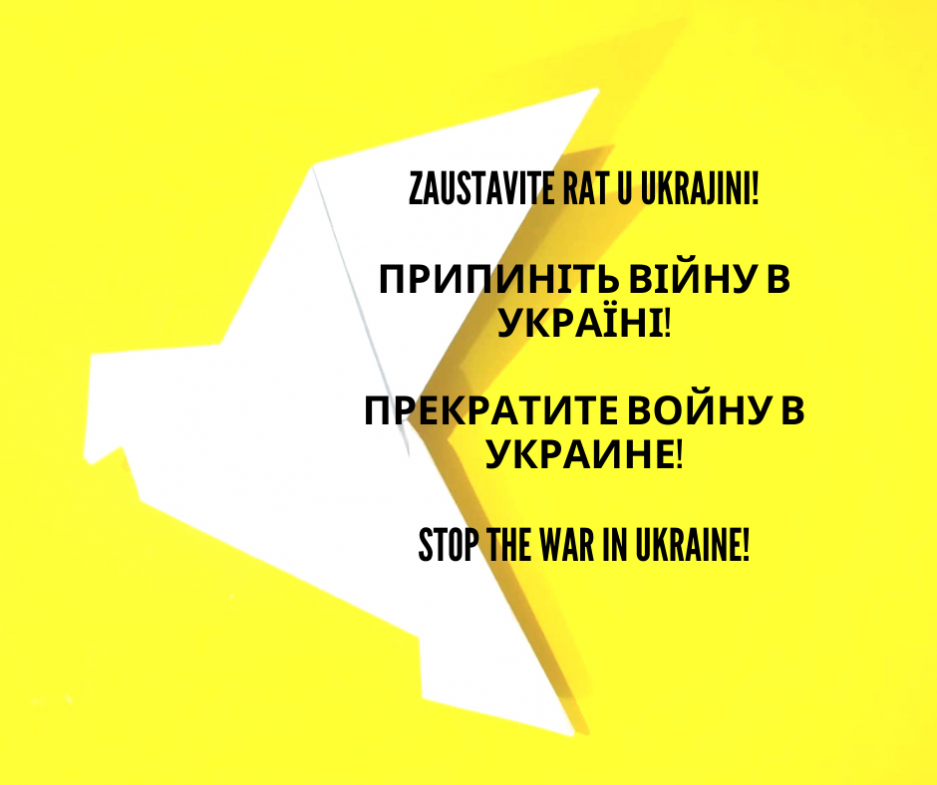Statement on the war in Ukraine

We call on Russia to immediately stop the war!
Although the Russian forces have taken most of Mariupol, the Ukrainian defence’s heroic resistance continues. We demand the opening of humanitarian corridors, and that the remaining civilians and fighters hiding in Azovstal be allowed to leave.
We demand a ceasefire and peace negotiations, in solidarity with Ukrainians, as well as all those in Russia who oppose the war.
Ever since the war broke out, when on 24 February one sovereign state attacked another, calling it the launching of a “special operation”, many war crimes have been committed, thousands of civilians and soldiers killed, and huge material damage caused.
We are witnessing a military aggression, and not a special operation, as the Russian authorities, media and military strategists call it. Every day, their misplaced illusions about Ukrainian nationalist usurpers are paid for by the lives of the inhabitants of Ukraine, as well as of young Russian men. As the war gained momentum, so the first killing grounds emerged, revealing mass graves; entire cities were destroyed, or their inhabitants driven out or starved. The persistent obstruction of attempts by the International Committee of the Red Cross and the Red Crescent to make their way to places besieged by Russian troops is also terrifying.
It is not only that the aggression against Ukraine contravenes international law, on no grounds can anyone deny the Ukrainians’ right to resist, their right to fight for their own freedom. Laying down arms while battles for the Donbas loom, would represent an erasure of Ukraine as an independent state and society, with the right to autonomously determine its own fate. No matter how horrible the number of victims this war will have taken, and no matter how direly necessary ceasefire, and eventually, peace, what the Russian authorities have to offer in return for ending their aggression could sooner be called pacification than peace. The same way that Chechnia was once pacified into a devastated protectorate under the tyranny of Putin’s vassal. Peace cannot be established under Russian conditions. The Russian authorities have lost all moral grounds to levy their demands in negotiations.
Evidently, it is those who rule Russia who are to blame for the aggression. However, we all bear responsibility for not having invested enough in reinforcing peace in the early days, for not having invested enough and supported the development of democratic institutions that can serve as a barrier to arbitrary political will, to human rights violations, when it was time to do so – for letting a great country descend into a violent autocracy whose only exports are fossil fuels and naked force. Now, not only the peoples of Russia, but of the entire Europe, have become this country’s hostages.
Ukraine is bravely fighting for its survival, but with insufficient support. However, once a ceasefire is signed, what comes next is the establishment of peace, followed by the continuous process of society-, institution- and identity-building. It is our firm belief that the Russian language and culture are an integral part of these, and that denying this would undermine the very conditions for the renewal of the Ukrainian society with all its communities, and undermine the conditions for building sustainable peace and a stable society.
Once peace is established in Ukraine, there will follow the arduous process of tracing missing people and enabling those forcibly displaced to return. Ukraine will also be faced with the need to rebuild a co-existence with Russia, which in turn will have to accept responsibility for the crimes committed in the name of all its citizens, as well as the fundamental political responsibility of the state institutions that enabled those crimes. Doubtlessly, these processes will be stymied by mistrust, hatred and exlusion – much as the Ukrainian society itself is in danger of political radicalisation. We do not doubt that in Russia itself, war crimes trials are going to be near-impossible under the current political conditions, just as their prosecution in Ukraine will be hindered by the unavailability of the accused. Trials before international courts, following on from the investigation launched by the Prosecutor of the International Criminal Court. However, there is no alternative to these processes.
We salute and encourage the work of the thousands of volunteers and organisations throughout Europe who have selflessly helped the refugees coming from Ukraine. Without European solidarity, the scale of the humanitarian catastrophe would be vastly greater.
We firmly uphold the work of Ukrainian human rights organisations that have been documenting the suffering caused by the war ever since 2014. Facts about the fates of those who were killed or disappeared are necessary for everyone’s sake. Evidence needs to be gathered as soon as possible, so that the facts and claims about the crimes could be verifiable and credible, and therefore we call on the institutions of the international community to provide these organisations with all the support they need in their work. We also salute all those who refuse to take up arms and desert the Russian army, and firmly endorse the work of all free-thinking citizens and organisations in Russia who oppose the war, and who have for years been subjected to systematic repression by Russian authorities and their agencies. Their survival is key to building the potential for the social and political change that Russia so direly needs.
We stand by the surviving Ukrainians who have been resisting the aggression and mourning their victims, demanding that both the UN and the European Union play a greater role in resolving this conflict.
Documenta – Centre for dealing with the past









